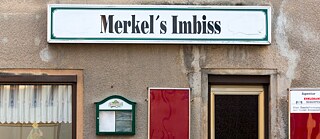The apostrophe continues to spark debates. But that’s over now: The Official Rules of German Orthography have clarified things. The former editor-in-chief of the leading German dictionary publisher breaks down the key points.
Why do I always want to call it das apostrophe? Do you know the feeling? You’ve looked something up dozens of times and still find yourself checking it again. Even former editors-in-chief of the German dictionary Duden face this struggle, even when it comes to language questions.A Small Mark, Big Controversy
Why has der apostrophe sparked debates and even a minor media spectacle in recent weeks and months? This small symbol has long been the focus of entire websites—some of them with blatantly discriminatory names like deppenapostroph.info (idiot’s apostrophe).Over the past few decades, the apostrophe has gained a bad reputation because it is often used in places where it doesn’t belong. For example: “Ich brauche neue Short`s” (“I need new Short`s.”) This seems to reflect a desire among writers to make certain (word) structures more visible.
The apostrophe indicates structures within a word that cannot or should not be expressed by letters.
4 Apostrophe Categories
The first group involves proper names ending in s, ss, ß, x, z, or ce that are used without an article. If the genitive -s is omitted and this omission needs to be marked, an apostrophe is used: Miles Davis‘ Jazz, Franz’ und Moritz‘ Leistungen in der NBA (Miles Davis’ jazz, Franz’ and Moritz’ achievements in the NBA).The second group also deals with proper names. When capitalization in proper names requires marking the morpheme boundary before the suffix -sch, an apostrophe is also used: die Duden’schen Regeln, die Razum‘sche WhatsApp-Gruppe (the Dudenian rules, the Razumian WhatsApp group). However, when treated as adjectives, these forms are written without an apostrophe: die dudenschen Regeln, die razumsche WhatsApp-Gruppe (Duden rules, Razum WhatsApp group).
The third group includes words from various parts of speech. An apostrophe is used when letters are omitted—for example, for poetic meter (heil’ge Orte, ’s regnet schon wieder; holy places, it's raining again) or to mimic spoken language (’n guten Morgen; heut’ müsst’ ich etwas früher weg; good morning; I have to leave a little earlier today). Frequently used forms can also be written without an apostrophe, e.g., heut komm ich später (I’ll come later today).
The fourth group involves contracted words: Machen Sie’s doch leichter und …(why don't you make it easier and …), weil sich’s gut liest (because it reads well), auf’m Berg ist ein Gasthaus (on the mountain is an inn). Common and formulaic contractions, however, can also be written without an apostrophe: wenns geht, wie gehts etc. (if it’s possible, how’s it going, etc.)
The Most Controversial Case: Peter’s Snack Bar
The most intriguing case involves (personal) names, where the most confusion arises. Initially, special, often traditional spellings with an apostrophe in proper names are permitted::Ku’damm (short for Kurfürstendamm, a street in Berlin), D’dorf (Düsseldorf).
The most frequent source of debate, however, is this rule: An apostrophe can be used to highlight the genitive -s in proper names when the entire construction is a proper name (p. 150). For example, you can write: Milena’s Blumenladen oder Milenas Blumenladen (Milena’s flower shop), Peter’s Imbiss oder Peters Imbiss (Peter’s snack bar), as these refer to the names of businesses.
However, for phrases like Milenas Mutter or Peters Auto (Milena’s mother or Peter’s car), no apostrophe is used because these phrases do not function as proper names.
The Apostrophe Brings Clarity, Not Confusion
In practice, it is sometimes challenging to determine whether a phrase truly constitutes a proper name. What matters is that the apostrophe can provide clarity here: Andrea’s Boutique belongs to a person named Andrea, either a woman or a man with the Italian name Andrea. Andreas‘ Männerboutique (Andreas’ Men’s Boutique), on the other hand, belongs to a man named Andreas.
Und wie ist diese Variante: This small symbol is meant to clear things up and should only be used in very specific cases. The Council for German Orthography will keep an eye on it—apostrophe and all.
January 2025
